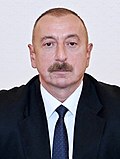| |||||
| Decades: | |||||
|---|---|---|---|---|---|
| See also: | |||||
This is a list of individuals and events related to Azerbaijan in 2023 .
| |||||
| Decades: | |||||
|---|---|---|---|---|---|
| See also: | |||||
This is a list of individuals and events related to Azerbaijan in 2023 .
| Photo | Post | Name |
|---|---|---|
 | President of Azerbaijan | Ilham Aliyev |
 | Vice President of Azerbaijan | Mehriban Aliyeva |
 | Prime Minister of Azerbaijan | Ali Asadov |
 | Speaker of the National Assembly of Azerbaijan | Sahiba Gafarova |


Caspian Oil & Gas Show is held in Baku Expo Center Baku on 31 May to 2 June 2023 showing the companies news of Azerbaijan and internationals related to sectors.


Major sports events on the 2023 sporting calendar include Chess World Cup, U22 European Boxing Championship, FIBA European Youth Championships 2023 (U 18, C division), numerous gymnastics events, and much more.
Azerbaijan will host Chess World Cup for the second time. Baku hosted the World Cup for the first time in 2015.